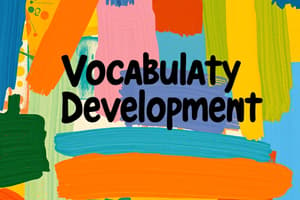Podcast
Questions and Answers
What is the primary focus of vocabulary expansion in this lesson?
What is the primary focus of vocabulary expansion in this lesson?
- Enhancing vocabulary related to personal preference
- Enhancing vocabulary related to goal setting, planning, and achievement (correct)
- Studying historical language origins
- Developing informal language skills
Which active learning strategy aids vocabulary development the most effectively?
Which active learning strategy aids vocabulary development the most effectively?
- Reading solely for comprehension
- Vocabulary building activities and games (correct)
- Listening to lectures
- Memorization of definitions
What do root words and affixes help with in vocabulary development?
What do root words and affixes help with in vocabulary development?
- They are irrelevant to vocabulary learning.
- They assist in building and understanding new vocabulary. (correct)
- They complicate the understanding of vocabulary.
- They solely focus on surface-level language skills.
What is a key element in distinguishing formal and informal language in vocabulary lessons?
What is a key element in distinguishing formal and informal language in vocabulary lessons?
How does this lesson plan to enhance students' understanding of word meanings?
How does this lesson plan to enhance students' understanding of word meanings?
What types of relationships are students expected to identify through exercises in the lesson?
What types of relationships are students expected to identify through exercises in the lesson?
What is emphasized for vocabulary application in this lesson?
What is emphasized for vocabulary application in this lesson?
Which approach is NOT part of building vocabulary through word parts?
Which approach is NOT part of building vocabulary through word parts?
Flashcards
Vocabulary Expansion
Vocabulary Expansion
Increasing your knowledge of words related to a specific topic like goal setting.
Active Learning Strategies
Active Learning Strategies
Methods like games or exercises to help you remember new words better.
Contextual Understanding
Contextual Understanding
Learning the meaning of words by understanding how they are used in a sentence or a situation.
Root Words & Affixes
Root Words & Affixes
Signup and view all the flashcards
Synonyms & Antonyms
Synonyms & Antonyms
Signup and view all the flashcards
Word Parts (analysis)
Word Parts (analysis)
Signup and view all the flashcards
Formal vs. Informal Language
Formal vs. Informal Language
Signup and view all the flashcards
Commonly Used Words
Commonly Used Words
Signup and view all the flashcards
Vocabulary Application
Vocabulary Application
Signup and view all the flashcards
Real-World Application
Real-World Application
Signup and view all the flashcards
Sentence Construction
Sentence Construction
Signup and view all the flashcards
Context Clues
Context Clues
Signup and view all the flashcards
Study Notes
Vocabulary Development
-
Vocabulary Expansion: The lesson focuses on enhancing vocabulary related to goal setting, planning, and achievement.
-
Active Learning Strategies: The lesson likely incorporates strategies like vocabulary building activities, practice exercises, and games to reinforce learning.
-
Contextual Understanding: The lesson emphasizes understanding words within specific contexts related to accomplishing goals and objectives. Building on previous lessons or units.
-
Root Words and Affixes: The lesson might explore the significance of root words, prefixes, and suffixes as tools for building and understanding new vocabulary.
-
Synonyms and Antonyms: The lesson may include exercises in identifying synonyms (words with similar meanings) and antonyms (words with opposite meanings) to enhance understanding of word relationships
-
Word Parts: The lesson could introduce techniques to analyze word parts like prefixes and suffixes to decipher word meaning. Examples of how word parts can be broken down and analyzed will be provided. Examples of root words and how they show in different related words will be provided.
-
Formal and Informal Language: The lesson likely differentiates between formal and informal language use. This might include instruction on when to use specific words depending on different situations e.g. speaking to a formal audience or a friend.
-
Commonly Used Words: Focus on words commonly used in the topic of goal setting, planning and achievement.
-
Specific Examples: Specific examples of words and how they are used in planning, goal setting, and achievement scenarios would be presented to show how the words can be applied to practical situations.
-
Vocabulary Application: The lesson will emphasize applying learned vocabulary to construct sentences, descriptions, paragraphs, and more, and provide practice on using the correct word every time.
-
Real-World Application: The lesson stresses the real-world applicability of the new vocabulary, showing how these words are integrated in everyday routines and in more complex, higher-level tasks.
-
Sentence Construction: Exercises in constructing sentences and using the new vocabulary within those sentences to increase understanding and application of the words.
-
Contextual Clues: The lesson highlights utilizing context clues, including surrounding text or phrases, to determine the meaning of unfamiliar words. Examples of how this is applicable in scenarios. Examples of specific sentences which use the learned words will be provided.
-
Word Origins: The lesson may touch on the origin of some vocabulary words in order to provide more context and insight into how particular words came to mean what they mean today.
-
Categorization and Grouping: The lesson likely teaches ways to classify words into categories or groups based on specific meanings. This is important to show patterns and relationships between the learned words.
Studying That Suits You
Use AI to generate personalized quizzes and flashcards to suit your learning preferences.




